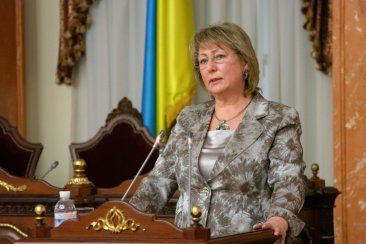Contact center of the Ukrainian Judiciary 044 207-35-46

On 29 May 2020 the Plenum of the Supreme Court supported the address to the Constitutional Court of Ukraine regarding the establishment of restrictions during the lockdown provided with separate regulatory acts adopted by the Cabinet of Ministers of Ukraine and the Verkhovna Rada of Ukraine.
Valentyna Danishevska, the President of the Supreme Court, was rapporteur on this issue. She remarked that all democratic countries fought for saving citizens’ lives and health, as well as democratic values while complicated periods. Thus, any steps towards fight against coronavirus disease and its consequences should take place within the Constitution and be proportional to the situation. However, these principles were not taken into account by the Cabinet of Ministers of Ukraine and the Verkhovna Rada of Ukraine; they adopted regulatory acts regarding restrictions for the lockdown period.
“Judges, as well as entrepreneurs, farmers and their families, transport operators, officials of service industry, citizens aged above 60 years, hospital patients, whose planned surgeries were cancelled for the lockdown period, suffered from such unweighted steps. Therefore, this time the Supreme Court has to become the voice of everybody, whose rights to medical care, to labor and entrepreneurial activity and other rights mentioned in our address, have been violated by the disproportionate establishment of restrictions” – Valentyna Danishevska emphasized.
According to her, in several European countries constitutional courts have already acknowledged such measures as unconstitutional and cancelled them. Some of the restrictive measures have already been cancelled in Ukraine; there is also a provisional plan of gradual easing of the lockdown. However, the fuzziness of the mechanism and lack of legal certainty as for the terms do not give an unambiguous answer, when the restrictions will be finished for citizens; there is also no comprehension, when the restrictions of judicial guarantees will be finished. “Thus, we have to safeguard our society from the further unconstitutional interference” – the SC President noted.
In his turn, the Chairperson of the High Council of Justice Andrii Ovsiienko put emphasis on the fact that in the context of the pandemic and lockdown, thousands of judges administered justice. “No court stopped working under such complicated circumstances, even despite total underfunding and significant staff shortage. Presently, we are talking not about the rate of judicial remuneration but about the principle of legal regulation of this issue, about the guarantees of independence of the judicial power and each judge, who bears it” – Andrii Ovsiienko informed.
The Chairperson of the Council of Judges of Ukraine Bohdan Monich drew attention to the fact that representatives of the legal and executive powers while adopting relevant regulatory act linked with the lockdown implementation had not listened to the judicial power’s precautions. Such situation resulted in the application of the restrictions, which had all features of unconstitutional ones, were controversial to international standards and undermined functioning of the judicial power as an independent institution.
According to Bohdan Monich, amongst all authorities, the restrictions applied only regarding judicial institutions are expressed in disproportionate reduction of judicial remuneration and wages for court staff officials.
Besides, the SC Plenum addressed to the Verkhovna Rada of Ukraine regarding the draft Law of Ukraine “On Amending the Law of Ukraine “On the Judiciary and the Status of Judges” Regarding the Restriction of the Maximum Amount of Monthly Judicial Remuneration while Emergency Situation in Ukraine” (registration No. 3495 of 15 May 2020).
The Secretary of the SC Plenum Dmytro Luspenyk presented the speech on this issue. He remarked that this draft law, in case of its adoption, would result in the decrease of financial security level of judges. The rapporteur emphasized that judges did not ask to increase their wages; they asked not to decrease them, not to violate the constitutional guarantees of judicial independence. The CCU has already repeatedly expressed its opinion regarding the unconstitutionality of this intent. Dmytro Luspenyk noted that national courts were facing significant understaffing; judges worked for themselves and for other judges without getting additional salary; there was no such situation in other state structures. Due to this fact, the SC Plenum has prepared an opinion regarding this draft Law noting that it did not correspond to fundamental provisions of ensuring judicial independence and was controversial to the Constitution of Ukraine.
Judges of the Grand Chamber of the Supreme Court Larysa Rohach and Olena Kibenko informed the SC Plenum about measures taken by the Supreme Court to ensure the uniformity of case-law, improvement of judicial management and communication.
Larysa Rohach put emphasis on the importance of ensuring the uniformity of case-law and underlined that different application of norms of substantial or procedural law occurred, particularly, due to the unsteadiness of law. The judge of the SC GC outlined problem issues as for the application of separate legal norms and measures aimed at achieving the stability of case-law.
According to Olena Kibenko, the Supreme Court takes different measures from the viewpoint of management and communications to form case-law uniformity. One of them is prompt and convenient delivery of information about judgments adopted by the Supreme Court.
“If the Supreme Court adopts a judgment, which may be interesting for lawyers, journalists, public, scholars, we inform about it in simple language applying contemporary communication methods” – the judges of the SC GC remarked.
Press release regarding a judgment is published on the web-site of the Supreme Court, as well as on social networks, for instance, on Facebook profile, which presently has 44 thousand subscribers. Besides, information about judgments is published on the SC Telegram channel.
Before beginning of the Plenum, the SC judges Alla Lesko, Valentyna Kurylo, Iryna Saprykina and Olena Sviatska, who had retired within a year, were awarded with breastplates “For Dedicated Work”. Valentyna Danishevska on behalf of all judges and in her personal capacity thanked the SC retired judges for their inspiration to the colleagues, for support, mutual assistance and thousands of considered cases.